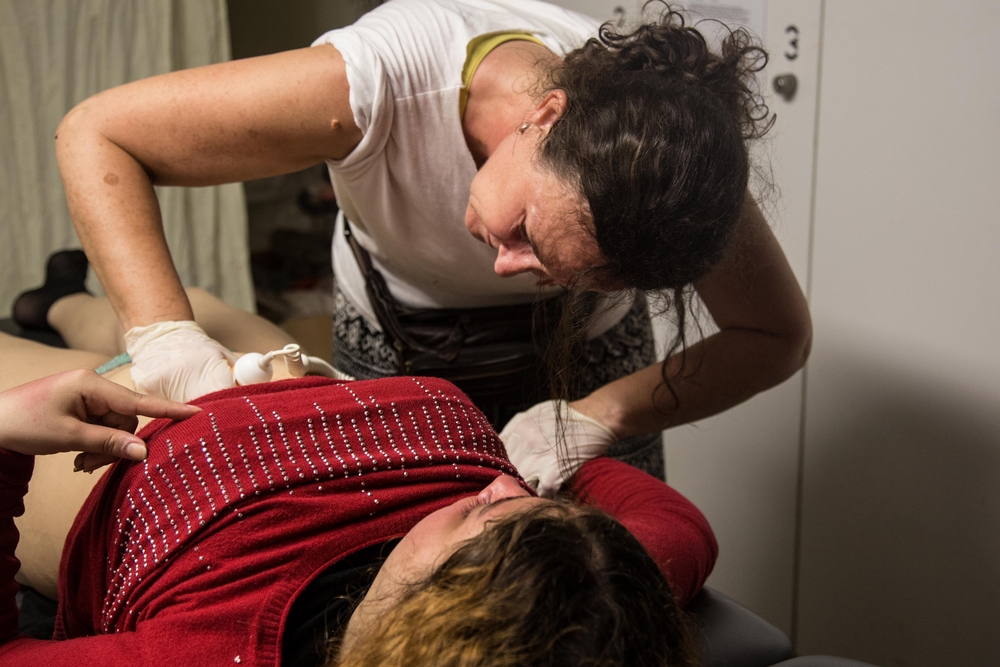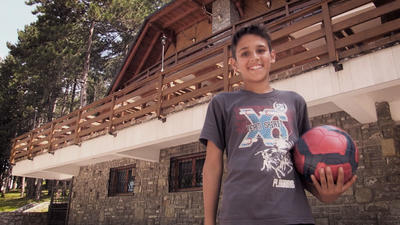Hundreds of people drowned after a boat capsized in the Mediterranean on 5 August 2015. The Médécins Sans Frontières/Doctors Without Borders (MSF) ship Dignity I assisted with the rescue of around 300 people. Here are some of their stories.
Mohammed, Diana and Azeel from Palestine
“I can swim, but she can’t… and how could I grab her from the water when all the other people were trying to stay afloat?”
Mohammed, 35, clutches his one-year-old daughter Azeel in his arms while his wife Diana, with bright, red eyes from salty water, tries to calm down inside the hospital area on board the Dignity I.
This Palestinian family was seconds away from losing their daughter when an overloaded wooden boat carrying them to Europe lost balance and capsized 14 miles off the Libyan coast.
They were brought to the MSF boat by the Irish rescue team because Diana needed urgent medical attention - just a week ago she had kidney dialysis.
The family, still traumatised by the event, could not comprehend what had happened.
A photo posted by Médecins Sans Frontières (MSF) (@doctorswithoutborders) on
“The boat was having problems after we left Libya, and we had to get rid of the water in the engine room. Afterwards things seemed to go better, and the sea was calm. Then, suddenly, the boat started moving and rocking and we realised we were sinking.”
When the Dignity I arrived at the scene, there was nothing but debris remaining of the wooden boat that Mohammed and his wife had taken to flee the war and instability in Libya, where they were living.
“The country is divided between rebels and militia. There is no future for us there, for our daughter. We were treated like worst kind of humans in Libya and people abused us. We needed to flee.”
Still shocked that they made it to safety, the family were evacuated to the Italian coast, where Azeel and her mother could receive proper treatment and recover from the trauma they had witnessed at sea.
Alea, Mohammed and Dana from Syria
Alea is five months pregnant. She hasn't felt the baby move for a week and she is worried.
She and her husband were desperate to leave Libya. She could not get access to healthcare there, because they could not afford a private hospital and public ones were reserved for Libyans.
Alea is shaking, she can barely restrain her emotions due to the shock and terror of the tragedy she has just witnessed.
“I was inside the ship when it started sinking,” she reveals.
Her husband Mohammed boarded the Dignity I only in his underwear, soaked to the bone. He had dived and pulled his wife to the surface, when she was stuck in the sinking boat.

In the hospital area, MSF midwife Astrid carefully arranges Alea on the bed to try to find her baby´s heartbeat.
It is a tense moment. In the corner stands Dana, a 17-year-old from Damascus who was also on the boat and became a friend of the family. Dana smiles and translates the midwife´s questions from English to Arabic: “When was the last time you felt the baby?”, “It was a week ago,” Alea answers.
Dana met Alea and Mohammed in Libya, when she was also fleeing from the war in her hometown, Damascus.
“I was so tired of seeing death and blood every day” she says.
The dramatic silence in the hospital room is finally broken by a sound, at first very quiet, that grows clearly into the sound of a heartbeat. The heartbeat of the five-month-old baby Alea had feared dead, that her husband saved when he pulled her from the boat.





